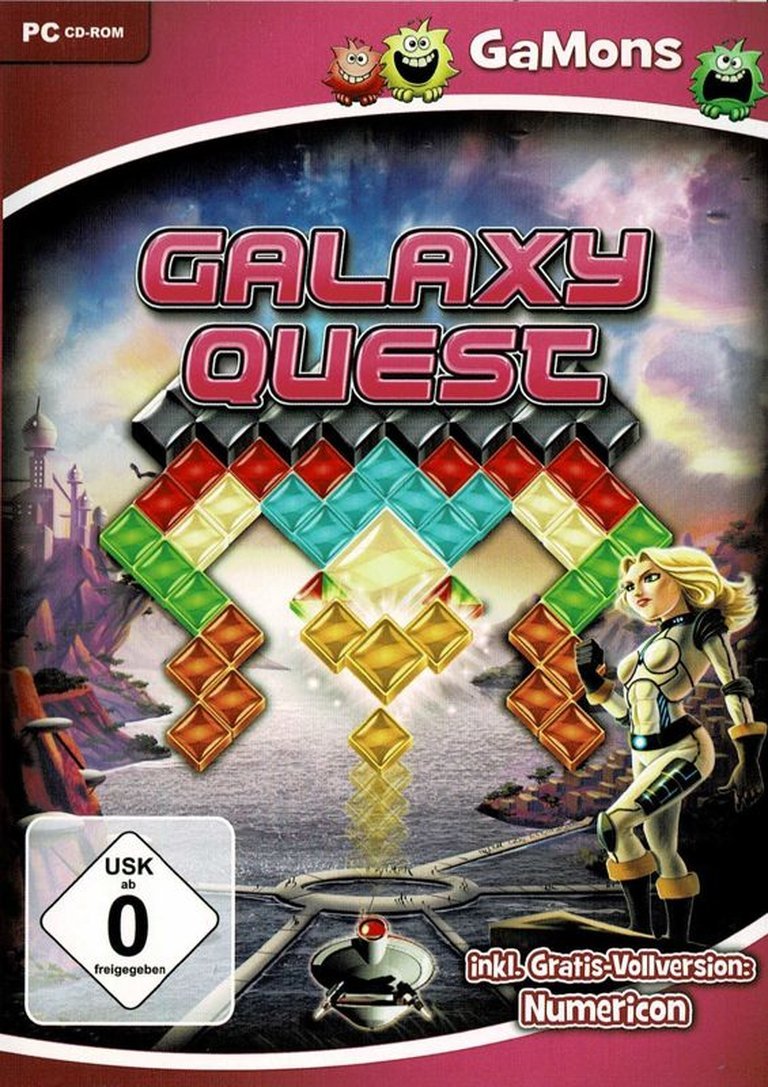- Release Year: 2012
- Platforms: Windows
- Publisher: rokapublish GmbH
- Developer: rokapublish GmbH
- Genre: Puzzle
- Perspective: Fixed / flip-screen
- Game Mode: Single-player
- Gameplay: Mini-games, Tile matching puzzle
- Setting: Fantasy

Description
Galaxy Quest is a tile-matching puzzle game released in 2012 for Windows. Players embark on a journey across 10 planets, choosing between male or female heroes, and tackle 100 levels with either a timed action mode or a relaxed mode. The game also features various mini-games to enhance the experience.
Galaxy Quest Mods
Galaxy Quest Guides & Walkthroughs
Galaxy Quest: Review
Introduction
Embarking on a journey across the cosmos with a pergament of tiles to manipulate, “Galaxy Quest” (2012) is a space odyssey of the puzzle variety. As a tile-matching game with both timed action and leisurely relax modes, it promises an engaging experience for fans of the genre. The ability to choose a male or female hero adds a touch of inclusivity to the escapades across ten distinct planets.
Development History & Context
In the realm of video games, “Galaxy Quest” was developed and published by rokapublish GmbH in 2012. Straddling the line between old-school puzzle gameplay and modern tropes like gender-inclusive主角s, it arrived at a time when the casual games market was thriving. The Windows release positioned it for accessibility, targeting a broad audience seeking both challenge and relaxation in equal measure.
Narrative & Thematic Deep Dive
The plot of “Galaxy Quest” is a straightforward hero’s journey: play as a brave explorer traversing ten unique planets to complete 100 levels. Though simple, this narrative framework gives context to the tile-matching tasks, transforming each level into a planetary challenge. The sci-fi setting evokes themes of interstellar adventure, while the fantasy undertones hint at mysterious worlds waiting to be discovered.
Gameplay Mechanics & Systems
At its core, “Galaxy Quest” is a tile-matching puzzle game. Players strategically swap adjacent tiles to create matches of three or more, clearing them from the board. The action mode introduces a timer for a high-pressure experience, whereas the relax mode allows for a more leisurely pace. Mini-games provide welcome diversions, adding variety to the core gameplay loop. Power-ups and bonuses enhance the strategic depth, encouraging players to plan moves in advance for maximum efficiency.
World-Building, Art & Sound
Visually, the game employs fixed/flip-screen graphics with vibrant colors and sci-fi-inspired designs. Each planet features unique environments, from alien landscapes to futuristic cities, providing a rich backdrop for the puzzles. The interface is intuitive, utilizing point-and-select mechanics that make it accessible for players of all ages. While sound details are sparse, the music likely supports the space-faring theme, enhancing immersion.
Reception & Legacy
Reception data is limited, with no critic reviews available on Metacritic. The game’s legacy seems to exist within niche puzzle game communities. However, the game’s availability through platforms like Big Fish Games suggests a continuing presence in the casual gaming market. Its unique combination of puzzle mechanics and sci-fi fantasy setting may resonate with a dedicated fanbase.
Conclusion
“Galaxy Quest” delivers an enjoyable tile-matching experience with a compelling sci-fi backdrop. While it may not break new ground in the puzzle genre, its blend of action and relax modes, mini-games, and inclusive protagonist options make it a worthy addition to any space enthusiast’s gaming library. Whether you’re a casual player looking for relaxation or a puzzle veteran seeking a challenge, the 100 levels and varied gameplay modes offer ample entertainment.